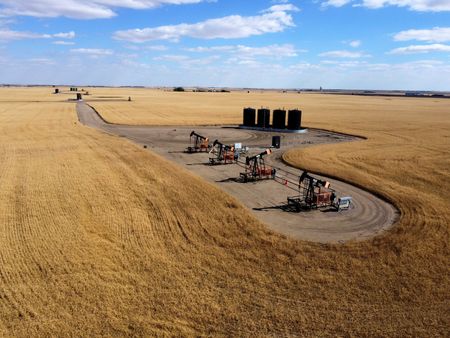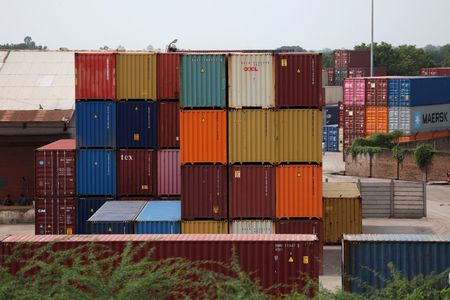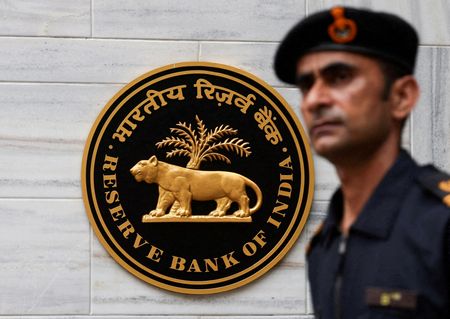By Georgina McCartney
HOUSTON (Reuters) -Oil prices rose more than 2% on Friday as Russia’s port of Novorossiisk halted oil exports following a Ukrainian drone attack that hit an oil depot in the Russian energy hub, stoking supply concerns.
Brent crude futures were up $1.43, or 2.27%, at $64.44 a barrel by 11 a.m. EDT (1600 GMT), while U.S. West Texas Intermediate crude rose $1.54, or 2.62%, to $60.23 a barrel.
At current levels, Brent was heading for a weekly gain of 1.26% and WTI a gain of 0.75%.
Friday’s attack damaged a ship in port, apartment blocks and an oil depot in Novorossiisk, injuring three of the vessel’s crew, Russian officials said.
“The hit on that Russian terminal was huge and seems to have had a bigger impact than previous attacks,” said Phil Flynn, senior analyst with Price Futures Group.
PORT EXPORTS 2% OF GLOBAL SUPPLY
The port paused oil exports, equivalent to 2.2 million barrels per day, or 2% of global supply, and oil pipeline monopoly Transneft suspended crude supplies to the outlet, two industry sources told Reuters.
“The intensity of these attacks has increased; it’s much more often. Eventually, they could hit something that causes lasting disruption,” said Giovanni Staunovo, commodity analyst at UBS.
Investors are trying to assess the impact of the latest attacks and what they mean for Russian supply longer term, he said.
Investors are also watching the impact of Western sanctions on Russian oil supply and trade flows.
Britain on Friday issued a special licence allowing businesses to continue working with two Bulgarian subsidiaries of sanctioned Russian oil firm Lukoil, as the Bulgarian government seized control of the assets.
The U.S. imposed sanctions banning deals with Russian oil companies Lukoil and Rosneft after November 21 as part of efforts to bring the Kremlin to peace talks over Ukraine.
About 1.4 million bpd of Russia’s oil, or almost a third of seaborne export potential, has been added to stocks held on tankers as unloading slows due to the U.S. sanctions against Rosneft and Lukoil, JPMorgan said on Thursday.
Unloading cargoes could become much more challenging after the November 21 cut-off to receive oil supplied by the companies, the bank added.
(Reporting by Georgina McCartney in Houston, Anna Hirtenstein and Robert Harvey in London. Additional reporting by Sam Li in Beijing and Siyi Liu in Singapore; Editing by Jan Harvey, Louise Heavens, Rod Nickel)











